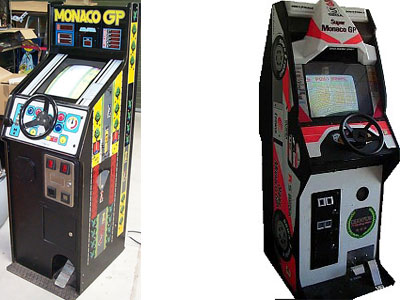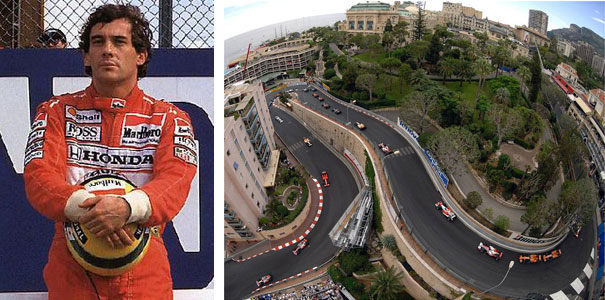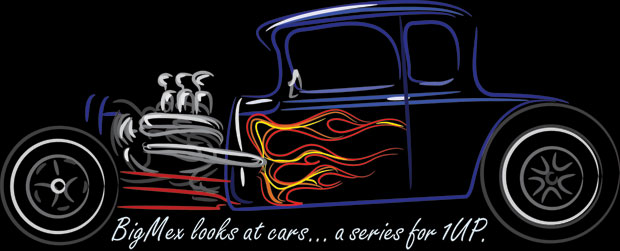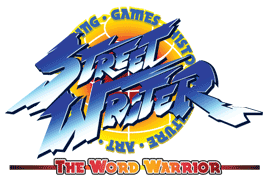Japan never went through a hot rod renaissance, a whole DIY culture built around hopping up pre-war iron. The topics I spoke of last week with regards to hot rod culture, car caricatures and drag racing were almost completely unknown in Japan. Auto racing they understood and also arcade gaming. The combination of both made for a couple of the greatest arcade titles ever, the Monaco racing series.

The original Monaco GP released in 1980 was possibly the first racing game that I remember being in color. It was also unique to me in how it played and how the graphics were presented. The steering wheel and pedals were similar to the earlier racing games from the US, but the 4-speed gear shift had been replaced by a 2-speed shift. Like other Japanese racers people could move between low and high and high gear and pray that nothing was in the way while in high gear. Most of the Atari and Kee Games racing hits of the time were from a top down perspective where players saw all of the track and controlled their car as they drove around. Monaco GP continuously scrolled up where paths and opponents would constantly be changing. This game also went into tunnels where drivers could only see opponents that crossed in front of the headlights. This added a very interesting dynamic to the game. However as fun as this game was in the arcade, it was not an accurate reflection of actual Formula-1 racing. This was Sega trying to figure out what the whole racing genre was about, a decade later they had just about perfected the template.

Super Monaco GP was the definitive racing game in the early 90's. Sega capitalized on a great gaming engine and an even bigger name. Ayrton Senna was the racing prodigy from Brazil. His name was growing by leaps and bounds and was on the fast track to surpassing every major sports star ever. He was a charismatic driver with an amazing ability and a big heart. His life was about racing on the biggest stage and fans adored him for it. Sega signed him to be the poster boy of Super Monaco GP, the cap on their F-1 racing legacy. Whereas the original Monaco GP played nothing at all like a real race the new title was extremely accurate. The track was based on the real-world Monaco, one of the most beautiful and challenging courses in the world.
The F-1 car is the pinnacle of racing machines, with a wide stance and a low profile it is the jet fighter of the automobile world, seemingly flying around the track and subjecting the driver to obscene g-forces. If the F-1 is a jet fighter then the top fuel dragster is a rocket ship. For only the dragster can claim to go any faster or push the driver any harder... however that is only in a straight line. Most racers around the world dream of competing on the global F-1 circuit. To achieve a world wide celeb status rivaling any sports or Hollywood superstar.
Sega's new and improved cabinets for Super Monaco GP featured more accurate steering wheels, gas and brake pedals. Where they were superior to every other racer to-date was in the shifting department. Gone was the unrealistic low and high gear from the early Japanese games, gone was the clunky 4-speed from the American games. Super Monaco GP had force feedback steering but that was not its major advancement to the genre. It was the first arcade game to feature the paddle-shifters. These were tabs located underneath the steering wheel where drivers could shift gears by fingertip. Paddle shift technology was just then being introduced into real F-1 racing and had become the next evolution in transmissions. Today we can find paddle shifters on several performance cars and daily drivers, but almost 20 years ago this was cutting edge tech and only available on the most expensive racing cars.
The new Super Monaco GP was also set in a cockpit view with a rearview mirror and gages set up on the display. Races at this level can sometimes come down to microseconds so all of the important information had to be available on screen. The position for the grand prix itself was even determined in qualifying, unlike other racing games where you usually start dead-last. There was some repetitive AI that could be exploited on the circuit but all-in-all this was an amazing game that made a decent transition to the Genesis. This was serious racing and despite the lack of polygon technology Sega managed to capture the look and feel of Formula-1.

I remember visiting the arcade in the Lakewood mall over and over trying to set new track times. There was a player that frequented it also and we never crossed paths except for seeing our respective names on the leader board. One day I was playing when the other person happened to walk into the arcade. That day I did the impossible, I qualified in the pole position using an automatic transmission. The other player couldn't believe it, he'd never seen a qualifying time that fast and in automatic, he asked if I was the NOE guy. I said "yeah, you must be AARON." He nodded. He told me that I really should switch to manual if I wanted to capture the top times. The auto transmission option prevented players from reaching maximum speeds in the game, it was a baby setting that I had grown used to. Somehow I made it work as Aaron and I battled for the top spot for months. It's a lot harder to beat the game with an automatic transmission but I'd done it time and time again. When I finally got used to the paddle shifter I became unstoppable on the game, pushing myself and the car as hard as Senna seemed to do year after year.
My memories of the original Monaco GP and Super Monaco GP were tempered by the untimely passing of Ayrton Senna. A few years after the game's release he lost control in a race and hit a wall in San Marino, dying on impact. I've never had a racing hero pass away doing what he or she loved. I've seen them get wrecked, catch fire even, yet always walk away. This was a grim reminder of the life they pursue and the ultimate price for living on the edge each and every race. It served to remind me of my own mortality. Someday I would pass on, would I be remembered, and be loved for all-time like Senna or would I fade away into obscurity? I grew up a lot in the mid-90's yet my passion for car games never diminished. Tomorrow I'll look at the game that got the entire planet into Formula-1 racing. Those that have been around for a while should already know what it is. I hope to see you back.


No comments:
Post a Comment